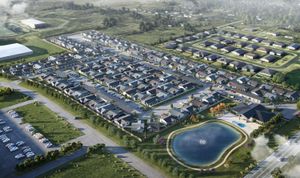A powerful earthquake struck the Middle East, leaving communities shattered and prompting urgent international response. On [insert date here], the quake, measuring [insert magnitude] on the Richter scale, had its epicenter near [insert specific location], affecting thousands across the region.
Reports indicate widespread destruction, with entire neighborhoods reportedly leveled and many buildings collapsing under the quake's force. "The devastation is unlike anything we have seen before," exclaimed [Name, Title], reflecting the shock felt by many. The aftermath revealed [insert number] casualties and significant injuries, urging immediate attention from local authorities and emergency services.
Responding rapidly, both local governments and international aid organizations mobilized resources to assist those impacted. The [insert relevant emergency service team], alongside emergency medical personnel, worked tirelessly to rescue individuals trapped under debris and provide medical assistance to the injured. “We are working tirelessly to provide aid to those affected,” stated [Name, Title].
Community support has surged, with neighbors helping each other amid the chaos. Temporary shelters have been set up, providing safety for those who lost their homes. Amidst the havoc, there's been a noteworthy effort to unite various aid groups aiming to coordinate the delivery of supplies and resources. This cooperation has been heartening, illustrating the resilience and determination of the affected communities.
Many individuals who have faced such adversity commend the solidarity exhibited by the international community. Countries like [insert names] have pledged support, sending aid packages and rescue teams. There aren’t just physical needs; emotional support is equally important. Psychological counselors are being dispatched to help victims cope with the trauma.
The earthquake's long-term effects are now under discussion, especially concerning rebuilding efforts. Experts predict this will be a protracted endeavor, requiring substantial resources and commitment to restore normal living conditions. "This isn’t just about rebuilding houses; it’s about rebuilding lives," noted [insert name, title]. The focus will need to be on not just physical infrastructure but also mental health support and community rehabilitation.
Even with the extensive damage, the resilience of the communities shines brightly. Neighbors and volunteers have come together, embodying the spirit of solidarity necessary to face these trying times. Efforts to fundraise and collect donations have begun, driving support from local and international donors.
Going forward, the focus will shift to both emergency recovery and long-term reconstruction. Experts estimate the full impact will become more clear as assessments are conducted over the coming weeks. With officials urging for continued donations, they stress the importance of preparedness for future seismic activities.
The outpouring of support, both locally and globally, serves as a reminder of the strength of human compassion even through the darkest of times. The commitment to recovery will be pivotal, as communities strive not just to rebuild but to strengthen ties and improve resilience against future disasters.



